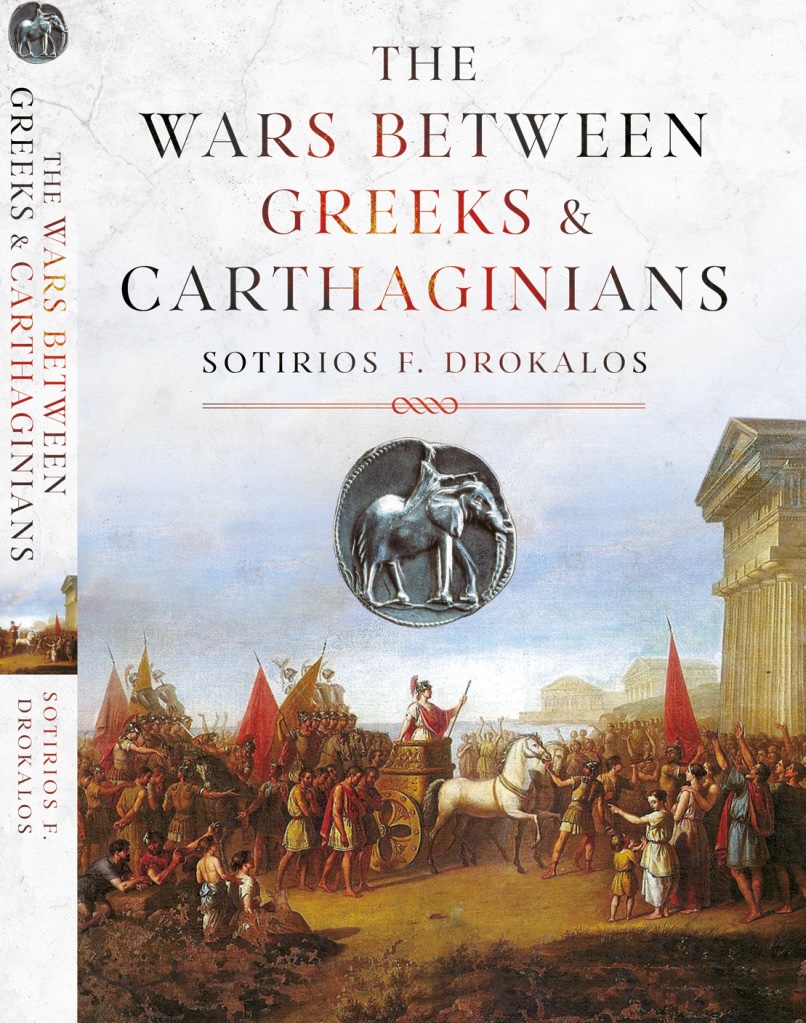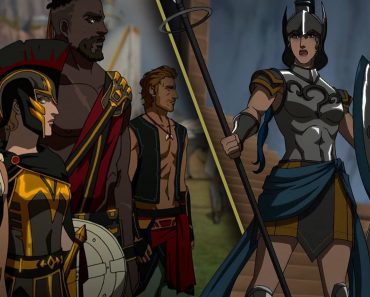
“The Greeks and Carthaginians were the two most potent ethnicities of the Western Mediterranean before the rise of Rome. They built cities and opened trade routes from Sicily to North Africa and the Pillars of Hercules, interacted both as rivals and partners, and, in many cases, went to war. However, the centuries-long clash for supremacy between the Western Greeks and the Carthaginians has been neglected by modern historians, even though it includes some of the most significant and most dramatic wars of great powers regarding their historical importance and the magnitude of the forces that took part in them.”
This is an excerpt from the blurb of a new book entitled The Wars Between Greeks and Carthaginians authored by Sotirios F. Drokalos. It was published early this month in Great Britain and will soon be available in the U.S. and Canada.
Drokalos, a Greek citizen, is the author of several publications on history and international politics written in English, Italian, and Greek. He holds three MAs in International Relations, Military History, and International Anti-Terrorism. More information can be found on his website: www.drokalos.com.
Drokalos talked with europeanconservative.com about his book, history education, and why people—especially young people—should be excited about history.
How did you become academically interested in the history of the Greeks and Carthaginians in the Western Mediterranean?

I have been very interested in the Western Greeks, and Greeks living in areas outside the current Greek state, ever since I was a high school student. I was amazed by the magnitude of the original Greek world and disappointed by the ignorance and awkwardness modern Greeks show towards it.
Syracuse, Massalia, Cyrene, and many other Greek cities in the West, as well as Miletus or Ephesus in the East, were metropolises of the ancient Mediterranean and offered an essential contribution to classical Greek civilization. At the same time, Carthage is always thought of as the enemy of Rome during its rise to prominence. But Carthage was a great commercial and maritime power centuries before Rome became an important city.
Both Greeks and Phoenicians/Carthaginians populated the Western Mediterranean. They had cultures and economies far more advanced than those of the sparse pre-existing populations.
It is thus a history of exploration, adventure, commerce, art, and war, with two fascinating ancient cultures as protagonists. I wanted to present this intertwined history of Western Greeks and Carthaginians to the international audience through the wars between them, which are always the best starting point. That was an authentic and long clash between ancient great powers, which also had many things in common and, in great part, co-existed as collaborators at the same time.
Why do you think people should know more about the history of the ancient Greeks and Carthaginians?
Some things are useful because they relate to your immediate reality, and others because they inspire you and offer you a more profound understanding and meaning of this reality. The history of ancient Greeks and Carthaginians is one of the latter. Studying ancient ethnicities and cultures, such as the Carthaginians and the Greeks, is crucial because they are a world, an era of human existence, from which we can gain knowledge and inspiration.
Why is it important for young people to learn about ancient and medieval history?
If you are excited about fantasy fiction books, movies, and TV series, or literature and cinema about social and personal relations, I can assure you that actual history is even more exciting.
Ancient and medieval history is an endless goldmine of fascinating stories. The distance and differences from our own time make it feel like a journey to other worlds, majestic and mysterious but real, to explore and understand. When you return from that journey, you get to see that it can make you grasp and know your reality better, far better. But I would insist on the fantasy and mystery aspect of the ancient and medieval worlds, being confident that young people will understand history’s importance if they first grasp its fascination.
Mythology can also play a crucial role in this. Many people become ancient historians because of their excitement for Greek Mythology, which is magnificent and full of larger-than-life figures of gods and heroes.
As a scholar of history, what do you think are the most serious deficiencies in history education in Europe?
History is the most politically sensitive science in the sense that historical representations and interpretations have a de facto great impact on politics and are often used as political propaganda. Sometimes, this propaganda is nationalistic, but in Europe today, it is more leftist and liberal.
Apart from that, though, teaching history is, in any case, a tough mission because the most exciting and satisfying part of studying and thinking about history necessitates a previous detailed knowledge of many events. So, if one has no natural inclination and passion for learning those events, one may never get to feel the true magic of history.
How should history education be improved?
I’d say something that may sound paradoxical coming from a historian: less is more. We should emphasize offering young people precise, general historical knowledge and exciting insights, not pushing for detailed understanding. After that, those who fall in love with the discipline should follow it in specialized classes, and finally, in university. At those higher levels, the standards and severity should be raised higher than they currently are.
We live in an amazing era where finding information is far easier than ever before, thanks to the internet and AI. The point of basic education systems would be to teach people how to synthesize and elaborate information rationally and objectively, and make them love studying and learning by giving them glimpses they won’t find easily on the web.
A major new study published in “Nature” on April 23 reveals that the Carthaginians, after the 6th century BCE, were genetically more similar to the Greeks and other Mediterranean peoples than the Phoenicians. How does this relate to your historical research?
This publication in Nature stunned many, as we can see by the articles dedicated to the findings of that study in The Economist, The New York Times, and elsewhere. But it wasn’t such a surprise for me. In my book, I explain that the Phoenician colonization was mostly about establishing trade hubs, while the Greek colonization involved massive migrations and the founding of large cities. Also, Carthaginian culture was initially just a part of the Phoenician one, but gradually became distinctly Punic. It later became profoundly Hellenized. This all implied that the initial Phoenician settlers were few, and the Carthaginian population of later centuries became diverse over time, with a strong Greek influence. In general, this study and other similar DNA studies in recent years prove that the Greek demographic impact on the Mediterranean was even larger than previously thought.
What kind of research methods did you employ to write the book? How long did it take you to finish writing it?
I first wrote about this topic in Greek, and the book was published in 2017. Between 2023 and 2024, I worked on preparing a broader and much more complete English version, changing and adding new parts and chapters, which extended the content substantially for this publication with Pen and Sword Books.
I used primary sources, plus numerous peer-reviewed articles and accredited books from modern scholarship on history and archaeology. Having lived in Italy for a long time also helped my geographical understanding of some regions mentioned.
The writing was concluded in different stages over the years and based on readings that extended literally for decades.







